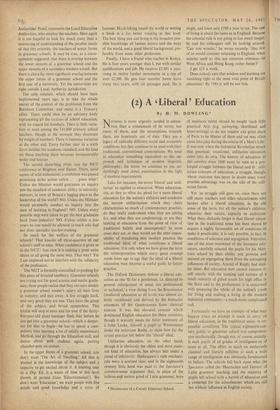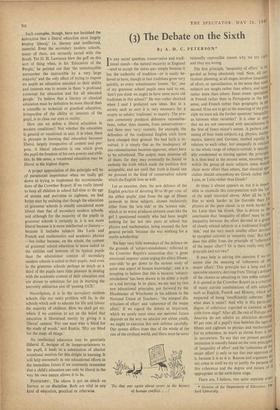(2) A 'Liberal' Education
By H. M. DOWLING*
NOTHING is more urgently needed in educa- tion than a restatement of its terms; too many of them, and the assumptions beneath them, arc hopelessly out of date. They are a legacy of radically different social and economic conditions, but they continue to be used with their traditional, conventional connotations. We need in education something equivalent to the ap- proach and technique of modern linguistic philosophy; the terms we continue to use un- thinkingly need closer examination in the light of modern requirements.
Take, for instance, the terms 'liberal' and 'utili- tarian' as applied to education. When education- ists, as they so often do, plead for a more liberal education for the nation's children and condemn the narrow utilitarianism which they claim characterises so much a contemporary practice, do they really understand what they are asking fcr, and what they are condemning; or are they looking at education from the point of view of traditional beliefs and assumptions? In most cases they are, or they would sec the utter impos- sibility of translating into modern practice the traditional ideal of what constitutes a liberal education. It is only when we have given the term the reinterpretation which every great concept needs from age to age that the ideal of a liberal education may become a useful guide to future practice.
The Oxford Dictionary defines a liberal edu- cation as one 'fit for a gentleman, i.e. directed to general enlargement of mind, not professional or technical,' a view dating from the Renaissance (mediaeval education at all levels was almost en- tirely vocational) and derived by the humanist educators of the Quattrocento from classical sources. It was this elevated concept which dominated English education for three centuries, though it scarcely needs the bitter testimony of a John Locke, himself a pupil at Westminster under the notorious Busby, to show how far the actual practice fell below the 'liberal' ideal.
Utilitarian education, on the other hand, though it is obviously the oldest and most essen- tial kind of education, has always lain under a cloud of inferiority. Shakespeare's rude mechani- cals were a scorned race; and in the eighteenth century little heed was paid to the Spectator's common-sense argument that, in place of the tedious and useless grind of Latin grammar, boys Headmaster of a County Grammar School. of mediocre talent should be taught 'such little practical Arts [e.g. surveying, shorthand and letter-writing] as do not require any great share of Parts to be Master of them and yet may often come into play during the course of a Man's Life.' It was only when the Industrial Revolution struck that practical, vocational, utilitarian education came into its own. The history of education in this country since 1800 must be seen as a pro- longed struggle between the liberal and th utili- tarian concepts of education; a struggle, though, whose outcome was never in doubt since every possible advantage was on the side of the utili- tarian forces.
Yet 'he struggle still goes on, since there are still many teachers and other educationists who hanker after a liberal education, in the old sense of the term, for all the nation's children, whatever their nature, capacity or ambitions. What these diehards forget is that liberal educa- tion in the traditional sense has been shown to require a highly favourable set of conditions- to make it practicable; it is only possible, in fact. in conditions of selection and segregation. Vittorino, one of the most renowned of the humanist edu- cators, carefully selected the pupils for his Man- tuan school by their ability and promise and insisted on segregating them from the corrupting influences of society. Arnold of Rugby had simi- lar ideas. But education now cannot concern it- self merely with the training and nurture of a small minority of gifted youth for high office in the State and in the professions; it is concerned with preparing the whole of the nation's youth for living and making a living in the modern industrial community—a much more complicated task.
Fortunately we have an example of what may happen when an attempt is made to carry on liberal education, in the traditional sense, in im- possible conditions. The typical eighteenth-cen- tury public or grammar school was comprehen- sive intellectually, though not, of course, socially. It took pupils of all grades of intelligence or of none at all. The effort to teach an exclusively classical and literary syllabus to such a wide range of intelligences was obviously foredoomed to failure. The schools fell back upon what the Spectator called the 'Heartaches and Terrors' of Latin grammar teaching and the majority of pupils left school with a hatred of education and a contempt for the schoolmaster which are still not without influence in English society. Such examples, though, have not banished the conviction that a liberal education must largely employ 'liberal,' i.e. literary and intellectual, material. Even the secondary modern schools, many of them, are earnestly tarred with this brush. Yet D. H. Lawrence blew the gaff on this sort of thing when, in his 'Education of the People,' he pointed out that 'the uninstructible outnumber the instructible by a very large majority' and the only effect of trying to impose on pupils an education unsuited to their ability and interests was to arouse in them 'a profound contempt for education and for all educated people.' To believe that a literary or classical education must by definition be more liberal than a scientific or technical or practical education, irrespective of the ability or interests of the pupil, is to close our eyes to reality.
How can we define a liberal education in modern conditions? Not whether the education is general or vocational in aim; it is when there is pleasure in learning that education becomes liberal, largely irrespective of content and pur- pose. A liberal education is one which gives the pupil the freedom of his own powers and abili- ties. In this sense, a vocational education may be liberal in the highest degree.
A proper appreciation of this principle will be of paramount importance when we really get down to trying to implement the recommenda- tions of the Crowther Report. If we really intend to keep all children in school full-time to the age of sixteen and part-time to eighteen, we had better start by realising that though the education of grammar schools is usually considered more liberal than that of secondary modern schools, and although for the majority of the pupils in grammar schools it certainly is, it is not more liberal because it is more intellectual or literary— because it includes subjects like Latin and French and mathematics and academic physics —but rather because, on the whole, the content of grammar school education is more suited to the abilities and interests of its typical pupils than the educational content of secondary modern schools is suited to their pupils. And even in the grammar schools perhaps as much as a third of the pupils have little pleasure in dealing with the academic content of their education and are driven to substitute for joy in learning the narrowly utilitarian aim of 'passing GCE.'
Nevertheless, it is in the secondary modern schools that our main problem will lie, in the schools which seek to educate for life and labour the majority of children. Here we shall get no- where if we continue to act on the belief that education is liberalised merely by giving it a 'liberal' content. 'For one man who is fitted for the study of words,' said Ruskin, 'fifty are fitted for the study of things.'
An intellectual education may be genuinely illiberal if, beca,use of its inappropriateness to the pupil, it leads to a substitution of ulterior vocational motives for this delight in learning. It will help immensely in our educational efforts in the immediate future if we constantly remember that a child's education can only be liberal in the way his own nature allows it to be.
POSTSCRIPT: The above is not an attack on literacy or on discipline. Both are vital in any kind of education, practical or otherwise.















































 Previous page
Previous page